I was born on a Dublin street where the Royal drums do beat
And the loving English feet they tramped all over us,
And each and every night when me father'd come home tight
He'd invite the neighbors outside with this chorus:
Oh, come out you black and tans,
Come out and fight me like a man
Show your wife how you won medals fown in Flanders
Tell them how the IRA
Made you run like hell away,
From the green and lovely lanes in Killeshandra.
Come let me hear you tell
How you slammed the great Pernell,
When you fought them well and truly persecuted,
Where are the smears and jeers
That you bravely let us hear
When our heroes of sixteen were executed.
Oh, come out you black and tans,
Come out and fight me like a man
Show your wife how you won medals fown in Flanders
Tell them how the IRA
Made you run like hell away,
From the green and lovely lanes in Killeshandra.
Come tell us how you slew
Those brave Arabs two by two
Like the Zulus they had spears and bows and arrows,
How you bravely slew each one
With your sixteen pounder gun
And you frightened them poor natives to their marrow.
Oh, come out you black and tans,
Come out and fight me like a man
Show your wife how you won medals fown in Flanders
Tell them how the IRA
Made you run like hell away,
From the green and lovely lanes in Killeshandra.
The day is coming fast
And the time is here at last,
When each yeoman will be cast aside before us,
And if there be a need
Sure my kids wil sing, "Godspeed!"
With a verse or two of Stephen Behan's chorus.
Oh, come out you black and tans,
Come out and fight me like a man
Show your wife how you won medals fown in Flanders
Tell them how the IRA
Made you run like hell away,
From the green and lovely lanes in Killeshandra.
And the loving English feet they tramped all over us,
And each and every night when me father'd come home tight
He'd invite the neighbors outside with this chorus:
Oh, come out you black and tans,
Come out and fight me like a man
Show your wife how you won medals fown in Flanders
Tell them how the IRA
Made you run like hell away,
From the green and lovely lanes in Killeshandra.
Come let me hear you tell
How you slammed the great Pernell,
When you fought them well and truly persecuted,
Where are the smears and jeers
That you bravely let us hear
When our heroes of sixteen were executed.
Oh, come out you black and tans,
Come out and fight me like a man
Show your wife how you won medals fown in Flanders
Tell them how the IRA
Made you run like hell away,
From the green and lovely lanes in Killeshandra.
Come tell us how you slew
Those brave Arabs two by two
Like the Zulus they had spears and bows and arrows,
How you bravely slew each one
With your sixteen pounder gun
And you frightened them poor natives to their marrow.
Oh, come out you black and tans,
Come out and fight me like a man
Show your wife how you won medals fown in Flanders
Tell them how the IRA
Made you run like hell away,
From the green and lovely lanes in Killeshandra.
The day is coming fast
And the time is here at last,
When each yeoman will be cast aside before us,
And if there be a need
Sure my kids wil sing, "Godspeed!"
With a verse or two of Stephen Behan's chorus.
Oh, come out you black and tans,
Come out and fight me like a man
Show your wife how you won medals fown in Flanders
Tell them how the IRA
Made you run like hell away,
From the green and lovely lanes in Killeshandra.
inviata da Riccardo Venturi - 18/5/2007 - 15:42
Lingua: Italiano
Versione italiana di Riccardo Venturi
18 maggio 2007
18 maggio 2007
VENITE FUORI, BLACK AND TANS
Sono nato in una via di Dublino dove battono i tamburi Reali
E dove gli amorevoli piedi inglesi ci calpestavano tutti quanti.
Ogni notte, ma dico tutte, quando mio padre rientrava ubriaco
Chiamava fuori il vicinato cantando questo coretto:
Oh, venite fuori, Black and Tans,
Venite fuori e battetevi con me da uomini
Fate vedere alle vostre mogli come vi siete guadagnati le medaglie nelle Fiandre,
Raccontate loro come l’IRA
Vi ha fatti scappare a gambe levate
Dai verdi e bei vicoli di Killeshandra.
Forza, fatemi sentirvi raccontare
Come avete pestato a sangue il grande Pernell,
Quando li avete combattuti e veramente perseguitati,
E dove sono tutte le fanfaronate
Che ci avete imperterriti fatti sentire
Quando venivano fucilati i nostri eroi del '16.
Oh, venite fuori, Black and Tans,
Venite fuori e battetevi con me da uomini
Fate vedere alle vostre mogli come vi siete guadagnati le medaglie nelle Fiandre,
Raccontate loro come l’IRA
Vi ha fatti scappare a gambe levate
Dai verdi e bei vicoli di Killeshandra.
Su, forza, raccontateci di come avete annazzato
Quei coraggiosi arabi, a due per volta,
Che come gli Zulù avevano lance, archi e frecce.
Diteci con quale coraggio le avete ammazzati tutti
Coi vostri cannoni con pezzi da sedici libbre
Terrorizzando i poveri nativi fino al midollo.
Oh, venite fuori, Black and Tans,
Venite fuori e battetevi con me da uomini
Fate vedere alle vostre mogli come vi siete guadagnati le medaglie nelle Fiandre,
Raccontate loro come l’IRA
Vi ha fatti scappare a gambe levate
Dai verdi e bei vicoli di Killeshandra.
Verrà presto il giorno,
Anzi il tempo è già arrivato
In cui ogni nobilastro ci verrà tolto dai coglioni,
E se ce n’è bisogno
Di certo I miei figli canteranno “Addio!”
con una strofa o due del coretto di Stephen Behan.
Oh, venite fuori, Black and Tans,
Venite fuori e battetevi con me da uomini
Fate vedere alle vostre mogli come vi siete guadagnati le medaglie nelle Fiandre,
Raccontate loro come l’IRA
Vi ha fatti scappare a gambe levate
Dai verdi e bei vicoli di Killeshandra.
Sono nato in una via di Dublino dove battono i tamburi Reali
E dove gli amorevoli piedi inglesi ci calpestavano tutti quanti.
Ogni notte, ma dico tutte, quando mio padre rientrava ubriaco
Chiamava fuori il vicinato cantando questo coretto:
Oh, venite fuori, Black and Tans,
Venite fuori e battetevi con me da uomini
Fate vedere alle vostre mogli come vi siete guadagnati le medaglie nelle Fiandre,
Raccontate loro come l’IRA
Vi ha fatti scappare a gambe levate
Dai verdi e bei vicoli di Killeshandra.
Forza, fatemi sentirvi raccontare
Come avete pestato a sangue il grande Pernell,
Quando li avete combattuti e veramente perseguitati,
E dove sono tutte le fanfaronate
Che ci avete imperterriti fatti sentire
Quando venivano fucilati i nostri eroi del '16.
Oh, venite fuori, Black and Tans,
Venite fuori e battetevi con me da uomini
Fate vedere alle vostre mogli come vi siete guadagnati le medaglie nelle Fiandre,
Raccontate loro come l’IRA
Vi ha fatti scappare a gambe levate
Dai verdi e bei vicoli di Killeshandra.
Su, forza, raccontateci di come avete annazzato
Quei coraggiosi arabi, a due per volta,
Che come gli Zulù avevano lance, archi e frecce.
Diteci con quale coraggio le avete ammazzati tutti
Coi vostri cannoni con pezzi da sedici libbre
Terrorizzando i poveri nativi fino al midollo.
Oh, venite fuori, Black and Tans,
Venite fuori e battetevi con me da uomini
Fate vedere alle vostre mogli come vi siete guadagnati le medaglie nelle Fiandre,
Raccontate loro come l’IRA
Vi ha fatti scappare a gambe levate
Dai verdi e bei vicoli di Killeshandra.
Verrà presto il giorno,
Anzi il tempo è già arrivato
In cui ogni nobilastro ci verrà tolto dai coglioni,
E se ce n’è bisogno
Di certo I miei figli canteranno “Addio!”
con una strofa o due del coretto di Stephen Behan.
Oh, venite fuori, Black and Tans,
Venite fuori e battetevi con me da uomini
Fate vedere alle vostre mogli come vi siete guadagnati le medaglie nelle Fiandre,
Raccontate loro come l’IRA
Vi ha fatti scappare a gambe levate
Dai verdi e bei vicoli di Killeshandra.
i nostri eroi del '16 non i nostri eroi di sedici anni...si riferisce all'Easter Rising del 1916
(Tia)
(Tia)
Grazie, Tia, per la segnalazione; abbiamo immediatamente provveduto a correggere la traduzione. Purtroppo molte inesattezze sfuggono, e cogliamo l'occasione sia per ringraziare tutte le frequentatrici e frequentatori del nostro sito per segnalarcele, sia per invitare chiunque, se se ne sente in grado, ad effettuare traduzioni alternative. [CCG/AWS Staff]
I wouldn't call this an anti-war song at all. And the English commentary is 50% paraphrase. In quotes, but still. Lol
faquarl - 8/10/2016 - 11:14
Dear Faquarl, we wouldn't call this a commentary at all; our site isn't made for simple and Twitter-like statements of personal opinions. If you don't think this is an antiwar song, please explain why you don't think so and your opinion will be welcome. The English commentary has been reproduced from a different page, but your commentary, if any, could be used as a deeper introduction to this song. Thank you.
CCG/AWS Staff - 8/10/2016 - 11:50
Lingua: Tedesco
Es ziehen die Söhne los
This is a replacement song sung in East Germany.
This is a replacement song sung in East Germany.
Auf einer Bahnstation
Tausend Meilen hinter Brest
Unser Zug hielt kurz
Da sah'n wir die zwei stehen
Einen Mann mit seinem Sohn
Dessen Haar war kurz geschor'n
Und da ahnten wir
Wohin sein Sohn sollt' gehen
Es ziehen die Söhne los, sind noch nichtmal richtig groß
Sind lange nach dem letzten Krieg geboren
Doch der Mann weiß sicher noch, wie das Brot des Krieges roch
Vielleicht hat er seinen Vater da verloren
Gab ihm die Pfeiffe mit und 'nen roten Rubelschein
Goss paar Vodka sich noch in die trock'ne Kehle
Ging mit schwerem Bauernschritt, auf dem ausgefahr'nen Weg
Zu den Häusern die wir in der Ferne sahen
Es ziehen die Söhne los, sind noch nichtmal richtig groß
Sind lange nach dem letzten Krieg geboren
Doch der Mann weiß sicher noch, wie das Brot des Krieges roch
Vielleicht hat er seinen Vater da verloren
Und fragt ihn doch einmal, ob er euer London braucht
Euer Dortmund, euer Rom und euer Bremen
Einen Fluch kehrt er zurück und die Bitterkeit im Blick
Sollte der, der ihn das fragt nicht übel nehmen
Es ziehen die Söhne los, sind noch nichtmal richtig groß
Sind lange nach dem letzten Krieg geboren
Doch der Mann weiß sicher noch, wie das Brot des Krieges roch
Vielleicht hat er seinen Vater da verloren
Es ziehen die Söhne los, sind noch nichtmal richtig groß
Sind lange nach dem letzten Krieg geboren
Doch der Mann weiß sicher noch, wie das Brot des Krieges roch
Vielleicht hat er seinen Vater da verloren
Tausend Meilen hinter Brest
Unser Zug hielt kurz
Da sah'n wir die zwei stehen
Einen Mann mit seinem Sohn
Dessen Haar war kurz geschor'n
Und da ahnten wir
Wohin sein Sohn sollt' gehen
Es ziehen die Söhne los, sind noch nichtmal richtig groß
Sind lange nach dem letzten Krieg geboren
Doch der Mann weiß sicher noch, wie das Brot des Krieges roch
Vielleicht hat er seinen Vater da verloren
Gab ihm die Pfeiffe mit und 'nen roten Rubelschein
Goss paar Vodka sich noch in die trock'ne Kehle
Ging mit schwerem Bauernschritt, auf dem ausgefahr'nen Weg
Zu den Häusern die wir in der Ferne sahen
Es ziehen die Söhne los, sind noch nichtmal richtig groß
Sind lange nach dem letzten Krieg geboren
Doch der Mann weiß sicher noch, wie das Brot des Krieges roch
Vielleicht hat er seinen Vater da verloren
Und fragt ihn doch einmal, ob er euer London braucht
Euer Dortmund, euer Rom und euer Bremen
Einen Fluch kehrt er zurück und die Bitterkeit im Blick
Sollte der, der ihn das fragt nicht übel nehmen
Es ziehen die Söhne los, sind noch nichtmal richtig groß
Sind lange nach dem letzten Krieg geboren
Doch der Mann weiß sicher noch, wie das Brot des Krieges roch
Vielleicht hat er seinen Vater da verloren
Es ziehen die Söhne los, sind noch nichtmal richtig groß
Sind lange nach dem letzten Krieg geboren
Doch der Mann weiß sicher noch, wie das Brot des Krieges roch
Vielleicht hat er seinen Vater da verloren
inviata da Albatross795 - 10/4/2022 - 07:34
Lingua: Inglese
Bold Orange Heroes of Comber
https://youtu.be/AvSRitFiASs
Loyal Orange Institution, commonly known as the Orange Order, is an international Protestant fraternal order based in Northern Ireland and primarily associated with Ulster Protestants, particularly those of Ulster Scots heritage.
https://youtu.be/AvSRitFiASs
Loyal Orange Institution, commonly known as the Orange Order, is an international Protestant fraternal order based in Northern Ireland and primarily associated with Ulster Protestants, particularly those of Ulster Scots heritage.
1.
*
As we march up and down on the road to Portadown,
Our drums they will blatter like the thunder.
And as the day draws near we’ll fill each Fenian heart with fear.
We’re the bold Orange heroes of Comber.
In Dublin there's a man and he says he has a plan.
He has ten thousand men or more they say.
But then we need not mind for they’re all half lame and blind.
We’re the bold Orange heroes of Comber.
*(Repeat)
2.
In Comber there’s a man; like his name he is headstrong.
He lives on the outskirts of Comber.
He says the day will come he’ll stick his foot through our big drum.
We’re the bold Orange heroes of Comber.
*(Repeat)
3
Then up comes the Pope, with a shovel up his coat.
And he says, “Boys go no farther.
We’ll tighten up a rope and we’ll stretch King Billy’s throat
And he’ll never never cross the Boyne water.”
*(Repeat)
*
As we march up and down on the road to Portadown,
Our drums they will blatter like the thunder.
And as the day draws near we’ll fill each Fenian heart with fear.
We’re the bold Orange heroes of Comber.
In Dublin there's a man and he says he has a plan.
He has ten thousand men or more they say.
But then we need not mind for they’re all half lame and blind.
We’re the bold Orange heroes of Comber.
*(Repeat)
2.
In Comber there’s a man; like his name he is headstrong.
He lives on the outskirts of Comber.
He says the day will come he’ll stick his foot through our big drum.
We’re the bold Orange heroes of Comber.
*(Repeat)
3
Then up comes the Pope, with a shovel up his coat.
And he says, “Boys go no farther.
We’ll tighten up a rope and we’ll stretch King Billy’s throat
And he’ll never never cross the Boyne water.”
*(Repeat)
inviata da Albatross795 - 10/4/2022 - 07:55
Mi chiedo cosa c'entrino in questa pagina i due ultimi interventi approvati, quelli firmati da tal Albatross795...
Forse non ho capito bene...
Forse non ho capito bene...
B.B. - 11/4/2022 - 20:05
Albatross795's contribution "Bold Orange Heroes of Comber" is a British Loyalist song, not "ANTI-WAR SONG", so I don't think is appropriate for this thread…
Nsv083 - 9/6/2022 - 13:40
Lingua: Giapponese
The famous Irish protest song "Come out ye, Black and Tans" has an original song; "Rosc Catha na Mumhan", which means "The Battlecry of Munster". The song originated as an Irish patriotic song written by the poet Piaras Mac Gearailt (1709-1792) during the former Seven Years' War. The song subsequently became popular among the Irish and was also crooned by the IRA.
I have written lyrics to this proud Irish masterpiece so that it can be sung in Japanese, and I wish Antiwarsong.org every success in its endeavours, so I contribute here.
La famosa canzone di protesta irlandese "Come out ye, Black and Tans" ha una canzone originale; "Rosc Catha na Mumhan", che significa "Il grido di battaglia di Munster". La canzone è nata come una canzone patriottica irlandese scritta dal poeta Piaras Mac Gearailt (1709-1792) durante l'ex Guerra dei Sette Anni. La canzone in seguito divenne popolare tra gli irlandesi e fu canticchiata anche dall'IRA.
Ho scritto i testi di questo orgoglioso capolavoro irlandese in modo che possa essere cantato in giapponese, e auguro ad Antiwarsong.org ogni successo nei suoi sforzi, quindi contribuisco qui.
I have written lyrics to this proud Irish masterpiece so that it can be sung in Japanese, and I wish Antiwarsong.org every success in its endeavours, so I contribute here.
La famosa canzone di protesta irlandese "Come out ye, Black and Tans" ha una canzone originale; "Rosc Catha na Mumhan", che significa "Il grido di battaglia di Munster". La canzone è nata come una canzone patriottica irlandese scritta dal poeta Piaras Mac Gearailt (1709-1792) durante l'ex Guerra dei Sette Anni. La canzone in seguito divenne popolare tra gli irlandesi e fu canticchiata anche dall'IRA.
Ho scritto i testi di questo orgoglioso capolavoro irlandese in modo che possa essere cantato in giapponese, e auguro ad Antiwarsong.org ogni successo nei suoi sforzi, quindi contribuisco qui.
マンスターの慟哭
Con la melodia "Rosc Catha na Mumhan"
1.
聞こえるか 同胞の
侵略を嘆く慟哭が
ケルトの風吹く大地に
勇士は今ぞ起ち上がる
いさ歌え友よ
祖国の守りに起て
戦火の闇が空を染むるも
我が勝利の日は今近し
いさ歌え友よ
祖国の和平連れて
暴虐の影が忍び寄るも
正義の光我が手にあり
2.
わが祖国 涙に濡れ
溟海の主は怒る
小鳥唱うこの調べに
叛逆の勇気託して
いさ歌え友よ
祖国の守りに起て
戦火の闇が空を染むるも
我が勝利の日は今近し
いさ歌え友よ
祖国の和平連れて
暴虐の影が忍び寄るも
正義の光我が手にあり
3.
始祖ミルの血潮湧きて
解放の劔ぞ光る
躙られし君の屍に
瞋恚ともして進みなん
いさ歌え友よ
祖国の守りに起て
戦火の闇が空を染むるも
我が勝利の日は今近し
いさ歌え友よ
祖国の和平連れて
暴虐の影が忍び寄るも
正義の光我が手にあり
Con la melodia "Rosc Catha na Mumhan"
1.
聞こえるか 同胞の
侵略を嘆く慟哭が
ケルトの風吹く大地に
勇士は今ぞ起ち上がる
いさ歌え友よ
祖国の守りに起て
戦火の闇が空を染むるも
我が勝利の日は今近し
いさ歌え友よ
祖国の和平連れて
暴虐の影が忍び寄るも
正義の光我が手にあり
2.
わが祖国 涙に濡れ
溟海の主は怒る
小鳥唱うこの調べに
叛逆の勇気託して
いさ歌え友よ
祖国の守りに起て
戦火の闇が空を染むるも
我が勝利の日は今近し
いさ歌え友よ
祖国の和平連れて
暴虐の影が忍び寄るも
正義の光我が手にあり
3.
始祖ミルの血潮湧きて
解放の劔ぞ光る
躙られし君の屍に
瞋恚ともして進みなん
いさ歌え友よ
祖国の守りに起て
戦火の闇が空を染むるも
我が勝利の日は今近し
いさ歌え友よ
祖国の和平連れて
暴虐の影が忍び寄るも
正義の光我が手にあり
Mansutā no dōkoku
1.
Kikoeru ka harakara no
shinryaku o nageku dōkoku ga
Keruto no kaze fuku daichi ni
yūshi wa ima zo tachi agaru.
Isa utae tomoyo,
sokoku no mori ni tate,
senka no yami ga sora o somuru mo
waga shōri no hi wa ima chikashi.
Isa utae tomoyo,
sokoku no wahei tsurete,
bōgyaku no kage ga shinobiyoru mo,
seigi no kōga ga te ni ari.
2.
Waga sokoku namida ni nure
meikai no omo wa ikaru.
Kotori utau kono shirabe ni
hangyaku no yūki takushite.
Isa utae tomoyo,
sokoku no mori ni tate,
senka no yami ga sora o somuru mo
waga shōri no hi wa ima chikashi.
Isa utae tomoyo,
sokoku no wahei tsurete,
bōgyaku no kage ga shinobiyoru mo,
seigi no kōga ga te ni ari.
3.
Shiso Miru no chishio wakite
kaihō no tsurugi zo hikaru,
Nijirareshi kimi no kabane ni
shin'i tomoshite susumi nan.
Isa utae tomoyo,
sokoku no mori ni tate,
senka no yami ga sora o somuru mo
waga shōri no hi wa ima chikashi.
Isa utae tomoyo,
sokoku no wahei tsurete,
bōgyaku no kage ga shinobiyoru mo,
seigi no kōga ga te ni ari.
1.
Kikoeru ka harakara no
shinryaku o nageku dōkoku ga
Keruto no kaze fuku daichi ni
yūshi wa ima zo tachi agaru.
Isa utae tomoyo,
sokoku no mori ni tate,
senka no yami ga sora o somuru mo
waga shōri no hi wa ima chikashi.
Isa utae tomoyo,
sokoku no wahei tsurete,
bōgyaku no kage ga shinobiyoru mo,
seigi no kōga ga te ni ari.
2.
Waga sokoku namida ni nure
meikai no omo wa ikaru.
Kotori utau kono shirabe ni
hangyaku no yūki takushite.
Isa utae tomoyo,
sokoku no mori ni tate,
senka no yami ga sora o somuru mo
waga shōri no hi wa ima chikashi.
Isa utae tomoyo,
sokoku no wahei tsurete,
bōgyaku no kage ga shinobiyoru mo,
seigi no kōga ga te ni ari.
3.
Shiso Miru no chishio wakite
kaihō no tsurugi zo hikaru,
Nijirareshi kimi no kabane ni
shin'i tomoshite susumi nan.
Isa utae tomoyo,
sokoku no mori ni tate,
senka no yami ga sora o somuru mo
waga shōri no hi wa ima chikashi.
Isa utae tomoyo,
sokoku no wahei tsurete,
bōgyaku no kage ga shinobiyoru mo,
seigi no kōga ga te ni ari.
inviata da Boreč - 27/9/2022 - 02:19
×
![]()

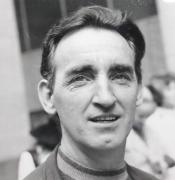
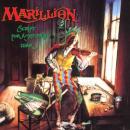
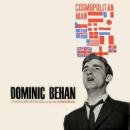



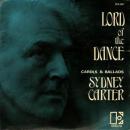
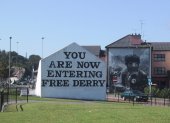
Lyrics and Music by Dominic Behan
Testo e musica di Dominic Behan
In Italia (ed anche altrove) pochi, probabilmente, sapevano dell'esistenza e delle "prodezze" dei Black and Tans, le bande paramilitari prima impiegate nella repressione in Palestina e poi impiegate negli anni '20 in Irlanda. Se qualcuno adesso ne sa qualcosa in più, lo si deve al grande Ken Loach e al suo recente film The Wind That Shakes The Barley (titolo infedelmente reso in italiano con Il vento che accarezza l'erba). Nel film, incentrato proprio sulla repressione in Irlanda negli anni '20, e in modo particolare delle atrocità commesse dei Black and Tans, bande di veri e propri criminali di guerra organizzati in reparti, reclutati da Winston Churchill e Lloyd George in persona. Sui Black and Tans si veda il completo articolo di en.wikipedia.
The lyrics are rich with references to the history of Irish nationalism and the activities of the British army throughout the world. While the title of the song refers to the Black and Tans of the War of Independence era, the specific context of the song is a dispute between Irish Republican and loyalist neighbours in inner city Dublin in the 1930s. The actual term "Black and Tan" originated from the lack of coordination of the British army with their uniforms. The troops stationed in Killeshandra wore a mix of black uniforms and tan (khaki) uniforms.
The song begins, "I was born in Dublin street, where the loyal drums did beat and the loving English feet they walked all over us". The narrator's father, coming home from the pub, "would invite the neighbours out" with this chorus;
come out and fight me like a man
show your wife how you won medals out in Flanders
tell her how the IRA made you run like hell away
from the green and lovely lanes in Killeshandra.
The reference to Flanders alludes to the neighbour's service in the British Army in the First World War. Killeshandra is a town in West Cavan likely to have been the scene of a successful IRA operation during the War of Independence. The service of the British Army in colonial wars against the Arabs and Zulus is also mocked, as the "natives" had "spears and bow and arrows" while the British "bravely faced each one, with your 16 pounder gun". The reference to "Arabs" probably refers to the counter insurgency campaign fought by the British against Arab guerrillas in the contemporary British Mandate of Palestine. Many of the actual Black and Tans served in Palestine after their time in Ireland.
The song goes on to describe the neighbour's previous gloating at the defeats of Irish nationalism, "when you thought us well and truly persecuted", for instance, when they "slandered great Parnell". However alongside the bitterness evoked in such sentiments is a triumphalism, borne of the fact that loyalists are a small minority in post-independence Ireland. The narrator asks, "where are the sneers and jeers, that you loudly let us hear, when our leaders of '16 were executed?". The implication is that the neighbours, no longer backed by the British state, no longer have confidence to express such sentiments in public.
The song closes on a hopeful note, promising that the time is coming when, "all traitors will be cast aside before us". The narrator promises that his children will say "God Speed" [i.e. go home], with the same song that his father used to sing to his loyalist neighbours.